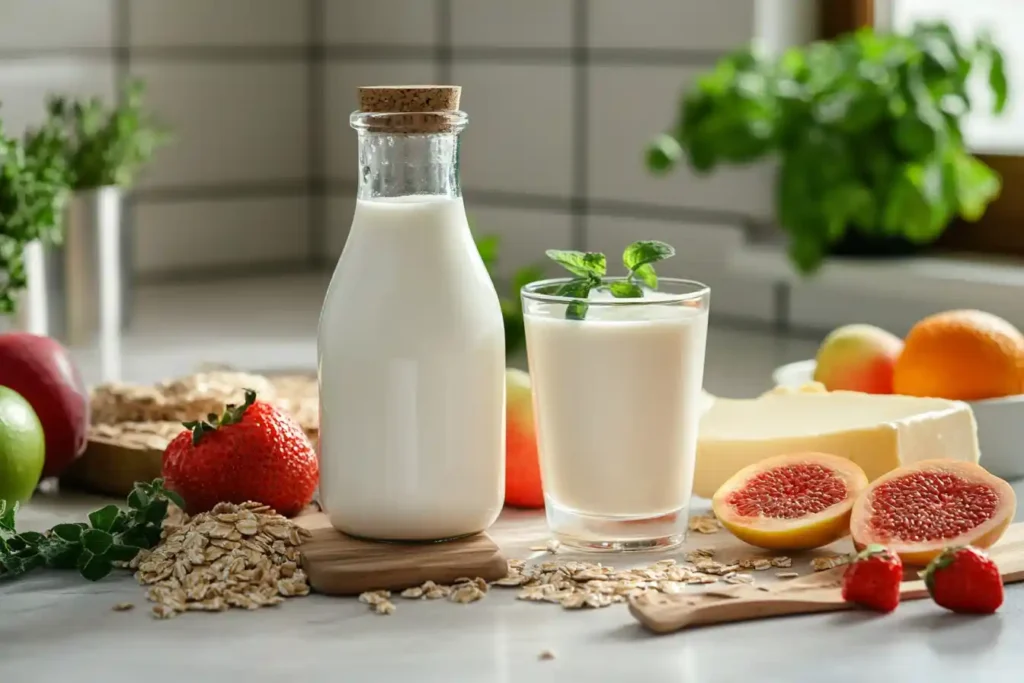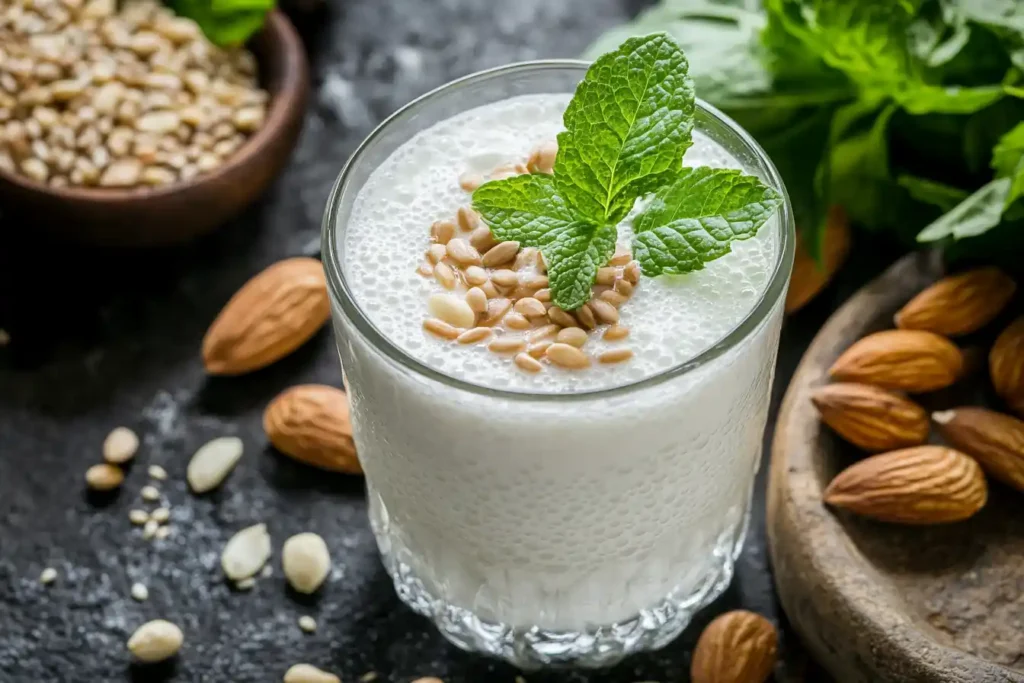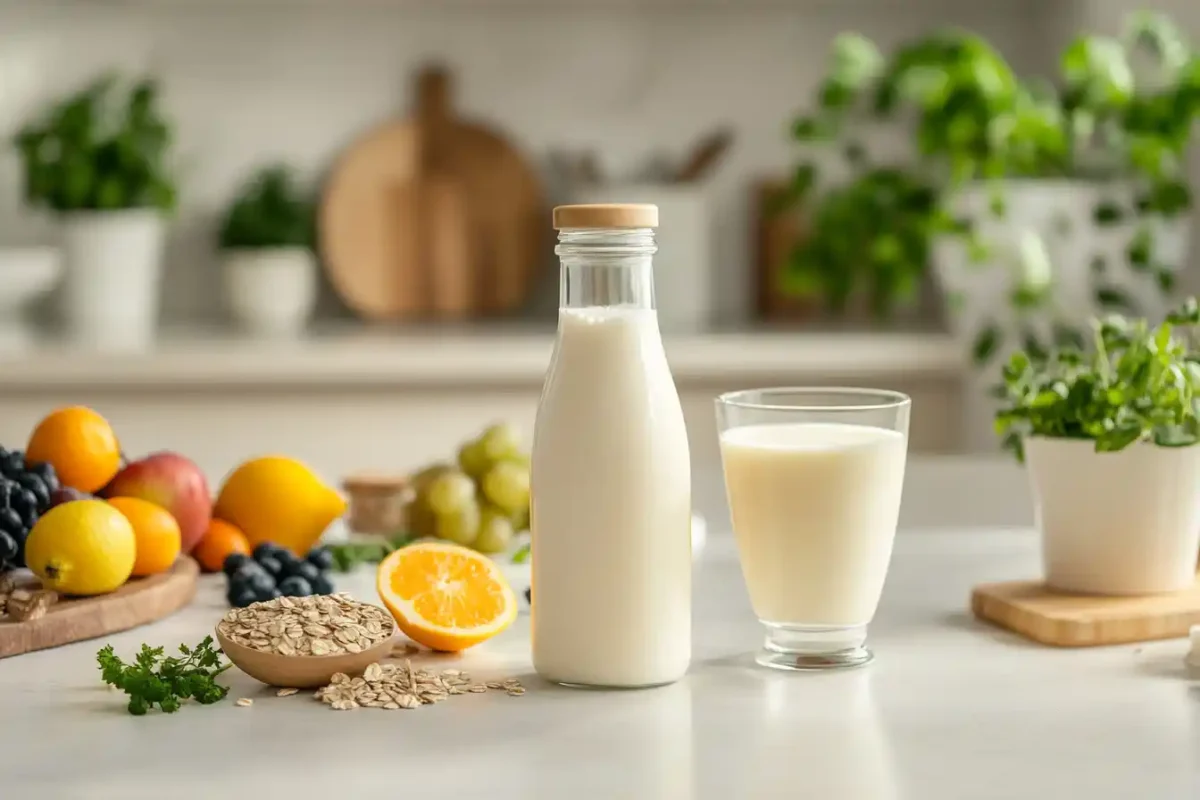When it comes to gut-friendly dairy products, kefir and buttermilk often steal the spotlight. Both are known for their health benefits and rich probiotic content, but they differ in taste, nutritional profiles, and overall impact on health. This article dives into the age-old question: Is kefir healthier than buttermilk? We’ll explore their origins, nutritional differences, and unique advantages to help you decide which one deserves a spot in your diet.
Understanding Kefir and Buttermilk
What is Kefir?
Kefir is a fermented dairy drink filled with healthy bacteria (probiotics) that help improve gut health. You make kefir by adding kefir grains to milk. These grains, which look like tiny pieces of cauliflower, mix with the milk and turn it into a tangy, fizzy drink by breaking down the lactose.
Kefir isn’t just made from milk. You can also find non-dairy options like coconut kefir or water kefir, which are great for people who can’t have dairy. No matter the type, kefir is known for being versatile and great for gut health.
What is Buttermilk?
Buttermilk, on the other hand, is a tangy liquid that has been a staple in traditional cooking for centuries. Historically, it was the leftover liquid from churning butter. Today, cultured buttermilk is made by adding lactic acid bacteria to pasteurized milk, which thickens it and gives it a distinctive sour taste.
Buttermilk is prized for its lower fat content compared to regular milk and its mild flavor. It’s commonly used in cooking, baking, and marinades, making it a favorite in many households.
Key Differences Between Kefir and Buttermilk
- Fermentation Process: Kefir involves live grains with multiple strains of bacteria and yeast, while buttermilk typically relies on one strain of lactic acid bacteria.
- Taste and Texture: Kefir is tangier and slightly effervescent, whereas buttermilk is creamier with a milder sour taste.
- Cultural Roots: Kefir has origins in Eastern Europe and Central Asia, while buttermilk has been a staple in Southern and Indian cuisines.
Both of these fermented drinks are highly beneficial, but their unique properties cater to different dietary needs and preferences. Stay tuned as we delve deeper into their nutritional profiles and health benefits in the next section.

Nutritional Comparison
Key Nutritional Components of Kefir
Kefir is known for its strong nutritional value. Each serving is packed with important vitamins and minerals like calcium, magnesium, phosphorus, and vitamin K2, which help keep your bones strong and reduce the chance of fractures. One of kefir’s best features is its wide range of healthy bacteria and yeast, with up to 60 types, making it excellent for gut health and improving immunity.
Kefir is also low in fat and a good source of protein. It contains special compounds, like peptides, that aid digestion and may even support heart health.
Nutritional Profile of Buttermilk
Buttermilk, while simpler than kefir, is still very nutritious. A cup of buttermilk contains plenty of calcium and a good amount of protein, similar to skim milk. It’s also low in fat because most of the fat is removed during the butter-making process. Additionally, buttermilk has natural salts (electrolytes) that help keep you hydrated, especially in hot weather or after exercise.
Although buttermilk has fewer healthy bacteria than kefir, the bacteria it does have helps with digestion and calms the stomach. This makes buttermilk a helpful choice for easing stomach problems like irritable bowel syndrome.
Kefir vs. Buttermilk: A Side-by-Side Comparison
Here’s how they stack up nutritionally:
- Calories: Kefir has slightly more calories, mainly from its natural sugars.
- Probiotics: Kefir takes the lead with its diverse strains.
- Electrolytes: Buttermilk has the edge for hydration.
- Calcium and Vitamin K2: Both are great sources, but kefir is superior when made from grass-fed milk.
If you’re debating, is kefir healthier than buttermilk, your choice depends on your health priorities—be it gut health, hydration, or protein needs.
Health Benefits

Benefits of Kefir for Gut Health
Kefir is excellent for your digestion. Its healthy bacteria help keep your gut balanced, which is important for breaking down food and getting nutrients. Drinking kefir often can make it easier to digest milk sugar (lactose) because the bacteria break it down during the process. Kefir also helps reduce swelling in the gut and can ease problems like bloating or upset stomachs.
Kefir does more than just help with digestion. The bacteria in kefir can strengthen your body’s defenses, making it easier to fight off colds or infections. Some studies even suggest that kefir has special proteins that may help prevent cancer, making it a great choice for staying healthy.
Health Benefits of Buttermilk
Buttermilk has a mild sourness that makes it gentle on the stomach. It helps calm heartburn, cleans the body, and cools you down, especially on hot days. Buttermilk is also packed with calcium, which helps keep your bones strong and lowers the chance of bone problems as you age.
If you want to manage your cholesterol, buttermilk is a good choice. It contains natural fats that lower bad cholesterol (LDL). It’s also a great drink after exercising because it replaces lost fluids and keeps you hydrated.
Shared Benefits of Kefir and Buttermilk
Both kefir and buttermilk are good for:
- Bone health: They are rich in calcium, which keeps bones strong.
- Weight control: They are low in calories but filling, so they help with staying in shape.
- Heart health: Regularly drinking them can lower blood pressure and cholesterol.
Adding either of these drinks to your diet can make a big difference to your health. So, is kefir healthier than buttermilk? Kefir has more healthy bacteria, but buttermilk is still a great option for other needs.u choose kefir or buttermilk, both have impressive health benefits. So, is kefir healthier than buttermilk? Kefir leads in probiotic diversity, but buttermilk offers its own unique perks.c diversity, buttermilk has its unique perks for hydration and digestion.
Taste, Texture, and Culinary Uses
Taste and Texture Differences
When comparing taste, kefir and buttermilk share similarities, but they also have distinct characteristics. Kefir is known for its tangy, slightly fizzy flavor, which comes from its fermentation process. Its effervescence can add a refreshing twist, making it enjoyable as a standalone drink or in smoothies.

Buttermilk, on the other hand, is milder and creamier. Its slightly tart, yogurt-like taste makes it a versatile ingredient for baking and cooking. While both are thick and creamy, kefir often has a thinner consistency compared to buttermilk, especially when consumed plain.
If you’ve ever wondered, is kefir healthier than buttermilk based on flavor preferences, it depends on whether you enjoy a tangy zing or a subtle sourness.
Culinary Applications
Both kefir and buttermilk are kitchen staples with diverse uses:
- Kefir: This probiotic-rich drink is fantastic in smoothies, salad dressings, and marinades. It can even be used in baking recipes like breads or muffins to add a subtle tang and enhance fluffiness.
- Buttermilk: Perfect for making pancakes, biscuits, and tender cakes, buttermilk adds a creamy texture and slight tartness. It’s also a popular choice for marinating chicken, as its acidity tenderizes the meat beautifully.
Experimenting with recipes that incorporate both can add a nutritious twist to your meals. For inspiration, check out this Kefir Sheet Cake Recipe for a delicious way to bake with kefir.
Production and Fermentation Process
How Kefir is Made
To make kefir, you start with kefir grains—a combination of bacteria, yeasts, and proteins. You add these grains to milk and leave the mixture at room temperature to ferment for 12–24 hours. During fermentation, the microbes actively digest lactose and produce lactic acid, carbon dioxide, and a small amount of alcohol. This process creates kefir’s tangy taste and boosts its probiotic content.
You can make homemade kefir using cow, goat, or plant-based milk. By adjusting the fermentation time, you can control the flavor, ranging from mild to intensely tangy. This versatility, combined with its health benefits, makes kefir an excellent addition to your diet.
How Buttermilk is Made
Traditionally, people made buttermilk by collecting the liquid left after churning butter from cream. Today, manufacturers produce commercial buttermilk by adding lactic acid bacteria to pasteurized milk. These bacteria ferment the milk sugars and transform the liquid into a tangy, thick drink with a smooth texture.
The simplicity of buttermilk production ensures it remains accessible and easy to use in a variety of recipes. Whether you bake with it or enjoy it as a refreshing drink, buttermilk plays an essential role in many cuisines.
A Key Difference Between Kefir and Buttermilk
Kefir stands out because its fermentation process uses a broader range of microbes, giving it greater probiotic diversity and more health benefits. Buttermilk, in comparison, relies on fewer bacterial strains, prioritizing its creamy texture and mild flavor. This distinction often positions kefir as the healthier option for gut health, helping answer the question: Is kefir healthier than buttermilk?
Which Is Healthier? A Final Verdict
Factors to Consider
Deciding whether kefir or buttermilk is the healthier option depends on what you value most in a food. If your primary focus is gut health, kefir comes out ahead. With up to 60 strains of beneficial bacteria and yeast, it offers unmatched probiotic diversity. This variety supports digestion, strengthens the immune system, and may even improve mood through the gut-brain connection.
Buttermilk, while not as probiotic-rich, has its own benefits. It’s hydrating, thanks to its high electrolyte content, and gentler on the stomach, making it a great choice for those with sensitive digestive systems. Additionally, its creamy consistency and mild flavor make it a versatile ingredient in cooking and baking.
So, is kefir healthier than buttermilk? For probiotic diversity and gut health, kefir takes the crown. However, for hydration and culinary flexibility, buttermilk is hard to beat.
Expert Opinions and Research Findings
Research consistently highlights kefir’s extensive health benefits, from improving bone density to reducing inflammation. Studies also suggest that its bioactive compounds may have anticancer and antimicrobial properties. Buttermilk, on the other hand, shines in its ability to lower cholesterol and provide essential nutrients like calcium and vitamin D.
In the end, both drinks have their place in a balanced diet. Kefir may be the better choice for intensive gut support, while buttermilk offers a comforting, versatile option for everyday meals.
Conclusion and Recommendations
Summary of Key Points
In this exploration of is kefir healthier than buttermilk, we’ve uncovered the strengths of both. Kefir, with its tangy flavor and robust probiotic content, is a powerhouse for gut health and immune support. Meanwhile, buttermilk holds its own with hydration benefits, digestive ease, and versatility in recipes.
Whether you prefer kefir’s fizz or buttermilk’s creaminess, both can contribute to a healthier lifestyle. The choice ultimately depends on your nutritional goals and personal taste.
Practical Tips for Choosing Between Kefir and Buttermilk
- For Gut Health: Choose kefir for its wide range of probiotics.
- For Cooking and Baking: Buttermilk’s mild flavor and creamy texture make it ideal for pancakes, biscuits, and marinades.
- For Versatility: Experiment with both to enjoy the unique benefits and flavors they bring to your meals.
Adding these fermented drinks to your diet can improve your overall well-being. Whether you reach for kefir or buttermilk, you’re making a deliciously healthy choice.
FAQs: Addressing Common Questions
What Are the Main Differences Between Kefir and Buttermilk?
Both kefir and buttermilk are fermented dairy drinks, but they have some key differences. Kefir is full of healthy bacteria and yeast, with up to 60 types, making it great for gut health. Buttermilk has fewer bacteria and offers a creamy, mild taste that works well in cooking.
If you’re asking, is kefir healthier than buttermilk, the answer depends on your needs. Kefir is better for digestion and boosting your immune system, while buttermilk is ideal for staying hydrated and soothing your stomach.
Is Kefir or Buttermilk Better for Lactose Intolerance?
Both drinks are easier to digest than regular milk for people who can’t handle lactose. Kefir is especially helpful because the fermentation process breaks down most of the lactose. Buttermilk has less lactose, too, but it doesn’t provide the same variety of good bacteria as kefir.
How Can I Use Kefir and Buttermilk in My Diet?
You can enjoy both drinks in many ways:
Kefir: Add it to smoothies, use it in salad dressings, or marinate meat with it.
Buttermilk: Use it in pancake or biscuit recipes, or mix it into soups and creamy sauces.
Are There Any Side Effects to Consuming Kefir or Buttermilk?
While both are generally safe, some people may experience mild bloating or gas when adding kefir or buttermilk to their diet. It’s best to start with small amounts and gradually increase intake to allow your digestive system to adjust.
Conclusion and Recommendations
The Final Takeaway: Is Kefir Healthier Than Buttermilk?
After diving into their nutritional profiles, health benefits, and culinary uses, the answer to is kefir healthier than buttermilk lies in your personal preferences and health needs. Kefir offers exceptional probiotic diversity, making it the better choice for gut health and immunity. Buttermilk provides hydration, digestive ease, and culinary versatility, making it ideal for everyday recipes.
Recommendations for Your Diet
- Start incorporating kefir into your morning routine with smoothies or drink it plain for a probiotic boost.
- Use buttermilk for weekend pancakes, biscuits, or as a refreshing drink on a hot day.
- Experiment with both to discover your favorite ways to enjoy these healthy, fermented drinks.
Whether you choose kefir, buttermilk, or both, you’re taking a step toward better health and delicious meals!

